In this article:
A number of cardiovascular diseases owe their existence to clogged arteries.

Atherosclerosis or clogged arteries is the narrowing of arterial vessels due to the buildup of plaque – a deposit of cholesterol, calcium, and fat. This can choke off the smooth flow of blood since arteries carry blood rich in oxygen and nutrients to various parts of the body from the proximal head to the distal foot.
This progressive accumulation of plaque poses a hindrance to the flow of nutrient-rich and oxygen-rich blood, impeding the proper functioning of the various organs and even causing potential damage to the body such as a heart attack.
Hence, it is imperative to keep your arteries healthy to maintain the strength, life, and functionality of your heart.
Although arterial blockage can progress with age, it rapidly enters the 30s and takes the center stage in the 50s or 60s.
Causes of Clogged Arteries
The buildup of plaque that results in clogged arteries begins once the inner lining of an artery is damaged. This leads to inflammation, and in a bid to heal the inflamed artery, plaque deposits on the affected region. (1)
The possible causes that can put you at risk of a blockage in your arteries are: (2)
- High blood pressure
- High levels of cholesterol and triglycerides in the blood
- Sedentary lifestyle
- A diet rich in fat
- Obesity
- Diabetes, either type 1 or type 2
- Smoking
- Inflammation as a result of being afflicted with arthritis or lupus
Excessive smoking is associated with atherosclerosis in the body’s main artery called aorta, arteries in the legs, and the coronary artery. Smoking is a key player in escalating plaque formation.
Signs and Symptoms of Clogged Arteries

Clogged arteries progress as you age but may not be detectable early. The symptoms may appear once it has taken a severe form, especially when the blockage is around 60%–70%.
Clogged arteries can cause symptoms that include:
- Chest pain (angina pectoris)
- Loss of appetite
- Weakness
- Anxiety
- Rapid breathing
- Sweating
- Tightness in the jaw
- Nausea
Because clogged arteries can be related to coronary artery diseases, it can manifest symptoms such as:
- Cold feet
- Muscle pull
- Numbness on one side of the body
- Pain in the upper body and back
- Leg pain
- Lower back pain
Treatment for Clogged Arteries
To alleviate the chances of a complication, clogged arteries might require medical intervention.
Your doctor may prescribe medications to lower the levels of LDL cholesterol alongside dietary changes. These actions should be seen as additional help rather than as solutions.
Similarly, a blocked artery may require surgical treatment. This could involve inserting a tube into the artery to remove the plaque while leaving behind a stent to support the artery walls and increase blood flow.
With severe blockages, doctors may perform a surgery called a heart bypass to make sure the blood can get around the obstructed artery.
Note: Prolonged blockage in the arteries can take life-threatening forms such as a heart attack or stroke if left unaddressed. Although home remedies may help to prevent or manage the preliminary stages of the disease, these should not be used as a substitute for medical treatment.
Alternative Remedies for Clogged Arteries
Because you can prevent or reduce the blockage in your arteries largely by eliminating bad cholesterol from your diet, it is important to include food sources that can bust the bad cholesterol and aid in its elimination.
The natural remedies listed below can come in handy due to their ability to diffuse arterial plaques.
1. Do regular exercise

A regular exercise regimen can help improve your heart health and manage your cardiovascular health. Physical exertion may help reduce stiff and clogged arteries.
Regular exercise will help you maintain a healthy body weight and prevent excess cholesterol from accumulating in your body.
How to perform:
- Do aerobic exercises such as walking, jogging, bicycling, and jumping rope to strengthen your heart function and improve your cardiovascular health.
- Also, include some cardiovascular exercises in your routine to improve heart health and keep arteries clear.
- Try some deep breathing exercises and yoga to help reduce mental and physical stress symptoms, which has a positive effect on your cardiovascular health. (3)
2. Drink garlic milk
Garlic is one of the best remedies to regress arterial blockages. It helps widen blood vessels, thereby improving blood circulation. (4)
According to a study conducted by the University of Alabama at Birmingham, (5) garlic can help relax blood vessels by up to 72% as compared with a placebo.
Moreover, garlic lowers bad cholesterol levels and reduces the risk of heart attacks or strokes.
How to use:
- Add three chopped garlic cloves to 1 cup of milk and boil it. Allow it to cool and drink it daily before going to bed.
- Also, include garlic in your cooking or take garlic supplements after consulting your doctor.
3. Add turmeric to your diet
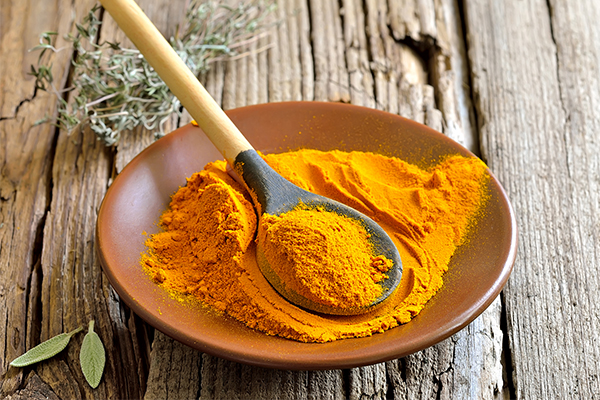
Turmeric is a well-known spice to combat oxidation and inflammation in the body. This property is attributed to its integral component curcumin, which may help prevent clogged arteries and keep your heart healthy by reducing the levels of bad cholesterol.
Aside from this, turmeric can also help prevent clots that are formed by blood platelets. (6)
- Add 1 teaspoon of turmeric powder and a little honey to 1 glass of warm milk. Drink this one or two times daily.
- Take turmeric supplements. The usual recommended dosage is 400 mg to 600 mg three times daily. However, consult a doctor before taking any supplements.
- Also, include turmeric powder in your cooking practices.
4. Take cayenne pepper concoction
The presence of the powerful anti-inflammatory compound capsaicin makes cayenne pepper a potent remedy to combat arterial plaques by increasing the good cholesterol (HDL), decreasing the bad cholesterol (LDL), and decreasing inflammation in the arteries. (7)
It also improves blood circulation and reduces the risk of heart attack and stroke.
How to use:
- Add a ½ to 1 teaspoon of cayenne pepper to 1 cup of hot water. Drink this solution two times daily for a few weeks.
- You can also take cayenne supplements but only after consulting your doctor.
5. Sip lemon water
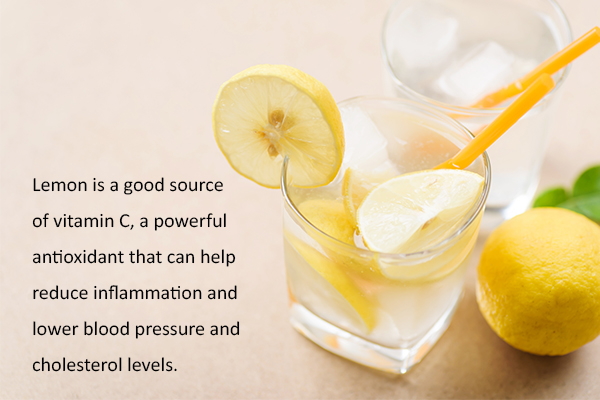
Lemon is a godsend source a powerful antioxidant-vitamin C. Vitamin C can help reduce inflammation and lower blood pressure and cholesterol levels by keeping a check on arterial inflammation and curbing oxidative damage in the bloodstream. (8)
How to use:
- Mix the juice of one lemon in 1 glass of warm water, along with a little honey and black pepper powder. Drink this solution one or two times daily for a few weeks.
- Alternatively, boil 1 tablespoon of lemon peels in 4 cups of water for 20 minutes. Strain the water and add honey to it. Drink 1 cup of this solution, three or four times daily for several weeks.
6. Drink ginger tea
Ginger is a storehouse of anti-inflammatory compounds that can lower blood pressure and diffuse arterial plaques.
The bioactive compounds gingerols and shogaols that compose this remedy can effectively lower total cholesterol, block LDL oxidation, help prevent plaque buildup, and lessen the existent blockage in your arteries. (9)
How to use:
- Drink 2 to 3 cups of ginger tea daily. Make the tea by adding 1 teaspoon of grated ginger to 1 cup of hot water. Let it steep for 5 minutes, strain the tea, and add a little honey.
- Alternatively, eat a small piece of raw ginger on an empty stomach daily or take ginger capsules after consulting your doctor.
Note: Do not use ginger remedies if ginger gives you gastric upset or heartburn or you are suffering from gallbladder problems or gallstones.
7. Chew fenugreek seeds
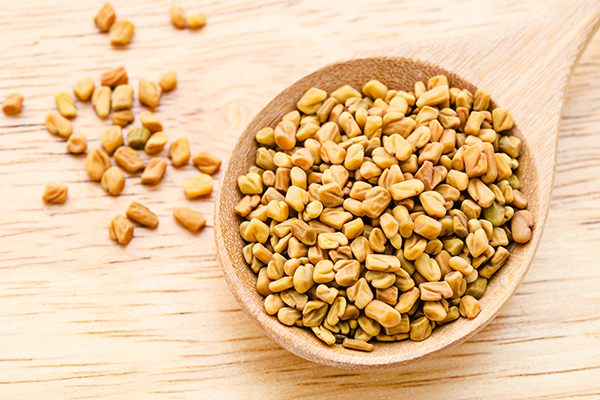
The saponins in fenugreek seeds can diffuse the effect of LDL and accumulated fat by their antioxidant action and treat clogged arteries efficiently.
Moreover, the high amount of fiber in fenugreek seeds plays a key role in binding to bad cholesterol and aiding in its excretion. (10)
How to use:
- Soak 1 teaspoon of fenugreek seeds in water overnight. The next morning, consume the soaked seeds along with the water on an empty stomach.
- Another option is to add 1 teaspoon of fenugreek seeds to 1 cup of water. Boil it for 5 minutes, strain the water, and add a little honey. Drink the solution one or two times daily.
8. Eat red yeast rice
Red yeast rice is packed with natural monacolins that help maintain arterial health by lowering the level of LDL cholesterol. (11)
Moreover, the concentration of phytosterols, beta-sitosterol, campesterol, stigmasterol, isoflavones, and many trace minerals that are heart healthy helps counter cardiovascular ailments. (12)
How to use:
- You can cook and eat red yeast rice like any other white or brown rice.
- Another option is to take red yeast rice tablets in 1,200 mg doses, two times per day, with meals. Always consult your doctor for the proper dosage and appropriateness for your condition.
9. Consume flaxseeds
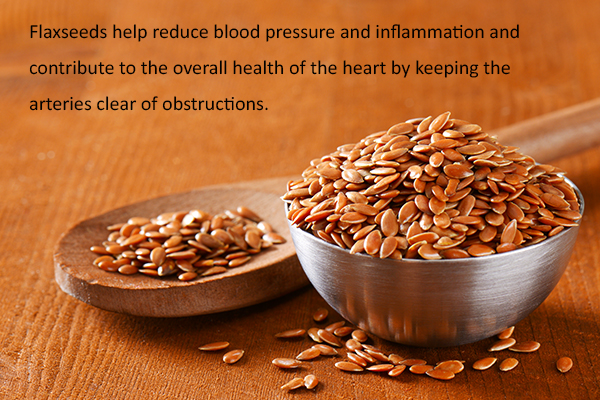
Flaxseeds contain copious amounts of alpha-linolenic acid (ALA), an omega-3 fatty acid. These seeds help reduce blood pressure and inflammation and contribute to the overall health of the heart by keeping the arteries clear of obstructions.
In addition, the fiber in flaxseeds helps clear clogged arteries by binding with bad cholesterol and facilitating its removal. (13)
How to use:
- Consume 2 to 4 tablespoons of ground flaxseeds daily to help clear clogged arteries.
- Alternatively, add ground flaxseeds in your smoothies, soups, and juices.
10. Drink pomegranate juice
Pomegranate is rich in antioxidant phytochemicals that help protect the circulatory system by scavenging free radicals that can cause plaque buildup and blood clots in the arteries.
Moreover, pomegranate stimulates the production of nitric oxide in the blood, keeping the arteries open and decreasing the levels of blood pressure. (14)
How to use:
- Eat one to two fresh pomegranates daily.
- You can also drink 1 glass of freshly extracted pomegranate juice once daily.
Additional Tips
- Strictly avoid the consumption of fried red meat, processed products, and junk foods.
- Enrich your diet with beans, whole grains, and fruits rich in antioxidants such as oranges, butternut squash, mangoes, tomatoes, watermelon, and blueberries.
- Sit in the early morning sunlight to replenish your vitamin D levels.
- Consume flaxseeds, walnuts, and at least two servings of fatty fish such as mackerel, tuna, trout, herring, and salmon to increase your omega-3 fatty acid intake.
- Cut down on your sugar intake.
- Drink 2 cups of green tea to curb your levels of bad cholesterol through its antioxidant action.
- To enhance the levels of good cholesterol (HDL), include 2–3 tablespoons of extra-virgin coconut oil in your diet. (15)
- Include extra-virgin olive oil in your culinary practices to maintain a healthy level of cholesterol. (16)
- Practice meditation to manage your stress levels.
Prevention of Atherosclerosis
Because clogged arteries are majorly caused by increased levels of cholesterol and triglycerides, making changes in your diet and lifestyle can help you whisk off the risk of plaque formation.
- Quit smoking.
- Have a wholesome diet to keep your heart healthy. Avoid foods that are high in saturated fats, salt, and sugar. Aim to eat five portions of fruit and vegetables a day.
- Exercise for at least 5 days a week.
- Maintain a healthy body weight to reduce the levels of bad cholesterol.
- Restrict the consumption of alcoholic beverages.
Complications Related to Clogged Arteries
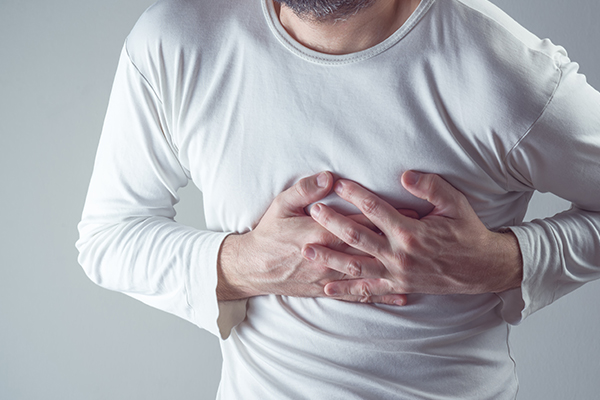
Coronary artery disease can lead to:
- Arrhythmia – This is an abnormality in the heart rhythm due to inadequate blood supply to the heart.
- Peripheral artery disease – This occurs as a result of plaque formation in the arteries of the arms and legs.
- Heart attack – This occurs due to improper flow of blood that can cause damage to your heart muscles. Rupturing of a cholesterol plaque can cause clot formation, which can possibly trigger a heart attack.
- Heart failure – This is a chronic condition where your heart’s efficiency to pump blood is reduced. This can deprive your body of its oxygen and nutritional demands.
Narrowing arteries can progress slowly over time. Timely diagnosis is very important. Managing clogged arteries with drugs, procedures, and home remedies can help reduce the risk of serious cardiovascular diseases.
Final Word
The predominant cause of clogged arteries is an elevated level of bad cholesterol and triglycerides in the blood. This can impede the smooth flow of blood and affect your overall health.
A perpetually clogged artery can result in fatal health conditions such as arrhythmia and heart attack. A visit to the doctor and routine checkups are a must for a proper diagnosis of atherosclerosis.
Aside from undertaking medications, incorporating regular exercise, following home remedies, and implementing dietary changes religiously can help tamp down the buildup of plaques in your arteries and maintain your heart health.
- Was this article helpful?
- YES, THANKS!NOT REALLY


